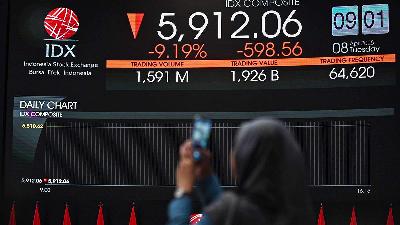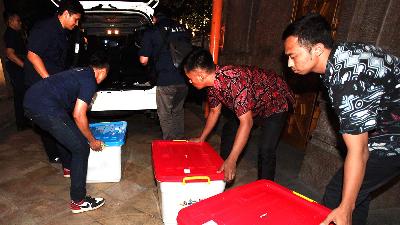A Problem Reserve from the Food Reserve
Monday, April 14, 2025
The food, energy and water reserve forest program could add to the problems of forest management. Social forests are still working well.
arsip tempo : 174532361817.

ONE characteristic of policies from the Prabowo Subianto administration is that they have grandeur but are hollow. One of these is the food, energy and water reserve forest program, which will make use of 26.7 million hectares of degraded forest. The impact will be significant, but the final form is still not clear, and it could even cause greater disaster.
Forestry Minister Raja Juli Antoni, a politician from the Indonesian Solidarity Party (PSI) who does not yet have a complete understanding of the meaning of deforestation, has not provided a robust explanation about the program that is part of Prabowo’s style of food security. Raja Juli has only said that the program will use the agroforestry concept.
As a new politician, Raja Juli needs to learn about the history of forestry management in Indonesia. Agroforestry has been practiced by Indonesian people since long before experts came up with the term. Local wisdom is an inseparable part of Indonesian local traditions and culture, subsequently given legal standing through the social forestry program.
Started in 2016, the social forestry program legitimized traditional forestry management practices that had been used in Indonesia for generations. As a part of people’s lives, forests automatically become a source of food, energy and water. Therefore, there is no need for Raja Juli to give these people’s activities a fancy sounding new label.
So, naming forests' utilization as food, energy and water reserves is pointless. From the outset, social forestry on degraded land has been aimed at creating forests that provide these three crucial needs. The use of a new name gives the impression it is only to make it appear that the minister is actually doing something. But the impact will confuse the people.
The public already knows about agroforestry, social forestry, intercropping and multi-forestry enterprises—concepts that it is claimed will form the backbone of the food, energy and water reserves forests program. What is needed is strengthening and transparency. The social forestry program has yet to be properly implemented because the distribution of access to forest management—which now covers 8.3 million hectares—does not always reach the right targets.
Instead of bringing benefits, the food, energy and water reserve forest program, for which 26.7 million hectares have been allocated, will bring new problems. The distribution of access to 12.7 million hectares of social forests during the administration of President Joko Widodo was not achieved. If the area is increased, it will be even more difficult to reach the social forestry target.
Rather than bombastically expanding the area of forest for food security, the government should simply focus on the social forestry program because it is already established, and the program is already underway. At a time of spending cuts, Minister Raja Juli could focus on building a supply chain for social forestry products so they are of good quality and have a sustainable market.
If the government focuses on comprehensively developing social forests, they will automatically become a source of food, energy and water without any need for new policies that require new methods or additional funding. The social forestry concept means building ecologically sustainable forests, reducing social conflicts arising from agrarian disputes, and bringing about economic independence for rural communities.











